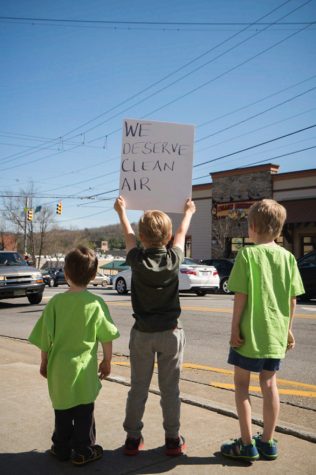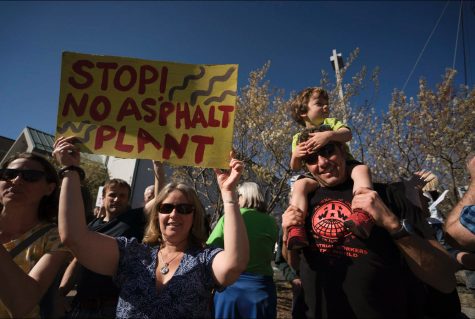Rainbow Trail residents protest asphalt plant construction
April 20, 2019
Angel Wood watched her 6-year-old son wave a homemade sign reading, “We deserve clean air,” outside the courthouse. As residents of Rainbow Trail neighborhood, Wood and her son joined the recently reignited fight against Appalachian Materials, the company that nearly constructed an asphalt plant in the family’s neighborhood four years ago.
At a rally held an hour before the April 16 Watauga County Board of Commissioners meeting, her son was one among many young activists. Around 200 people dressed in green demonstrated their distress over potential construction of an Appalachian Materials asphalt plant. The facility’s proposed location is in the heart of the Rainbow Trail neighborhood and less than one mile from Hardin Park Elementary, Grace Academy, Boone United Methodist Preschool and Mountain Pathways Montessori School.
“I wish he didn’t have to become an activist at such a young age,” Wood said.
Following the rally, protestors attended the meeting to present concerns regarding the plant’s possible impacts on public health, property devaluation and environmental degradation.
The rally was organized by the environmental activism group High Country Wataugans Against Toxins Close to Home.
On March 27, the Supreme Court of North Carolina declined to listen to a Rainbow Trail case appeal. Without a decision from the higher court, the ruling put forth by the NC Court of Appeals in Nov. 2018 was upheld, which reversed and remanded the Watauga County Superior Court affirmation originally denying Appalachian Materials from acquiring a high impact land use permit to create the plant in Sept. 2017.
“It has potential for high impact because the location of it being in a more densely populated area,” town council member Lynne Mason said at the rally. “It’s just not the right location for an asphalt plant; you just don’t put one in the the middle of an established community.”
Kerry Covell, a homeowner whose property borders the proposed site, said moving from his home could be life-threatening for his wife, Sharon Covell, and him. Both are 81 years old and suffer from chronic bronchitis and asthma.
During public comment section of the meeting, associate director for the Institute of Health and Human Services at App State Mary Sheryl Horine listed a series of toxic air pollutants associated with asphalt production. The list she referred to included arsenic, benzene, formaldehyde, mercury, phenol and dozens more.
The Blue Ridge Environmental Defense League, a regional nonprofit environmental organization, published several reports exploring the impact of asphalt pollutants on human health. The reports cite arsenic as a “toxic heavy metal,” benzene as “a known human carcinogen,” formaldehyde as an “acute irritant” and “probable human carcinogen.”
“I’m doing this for my dad, who died after 23 years of occupational exposure in an asphalt plant,” resident Tony Schlake said during the time allotted for public comment.

Angel Wood’s son stands tall with his sign as the rally kicks off.
Air pollutants weren’t the only concern discussed. Several residents noted the proposed plant site lies over a ravine that funnels water into the New River, which supplies water to most of Boone.
“We’re talking about major impacts on many people who live in the very central part of Boone, “ Will Canu, a professor in the Department of Psychology said. “Imagine the admissions portfolios that would feature an asphalt plant producing these kinds of toxins immediately above the main water source for the university.”
Residents of Rainbow Trail and surrounding neighborhoods were also worried about a loss in property value. Residents said they expect the value of their land to drop 30-50%, which would make it hard for the homeowners to sell their land for the price they purchased it for.
“We put a large amount of our finances into our home and paid it off 30 days before, four years ago, we found out that this was going to happen,” resident Bob Herring said.
Lauren Waterworth teaches environmental law and regulation in the Department of Geology. Waterworth asked that the county arrange a compilation of accessible information to hold Appalachian Materials accountable, should they win the case.
Her list for the compilation includes:
- statistics on all residencies, schools, child care facilities and vulnerable populations within a close proximity to the site
- the projected impact on property values
- a list of permits and requirements the company would need to adhere to
- a compliance history of Appalachian Materials and their parent company, Radford Quarries
- a complete account of nuisance or personal injury claims against the company
- results from consistent air quality and water quality monitoring.

Families from around Boone came out to protest the potential construction of an asphalt plant in the Rainbow Trail neighborhood. The plant would be located in the vicinity of four elementary schools.
When the case began in 2015, Watauga County Planning and Inspections Director Joe Furman denied Appalachian Materials a high-impact permit, which would have allowed them to build, provided they follow regulations put in place by the county. The Watauga County Board of Adjustment and Watauga County Superior Court supported his decision. Residents of Rainbow Trail believed the fight was won at the time.
“So, now the ball is in your court, and I know that there are many hurdles to be presented,” BREDL executive director Louis Zeller said, addressing the commissioners. “Do everything that you can to stop Appalachian Materials; I wouldn’t want them running a lemonade stand.”










